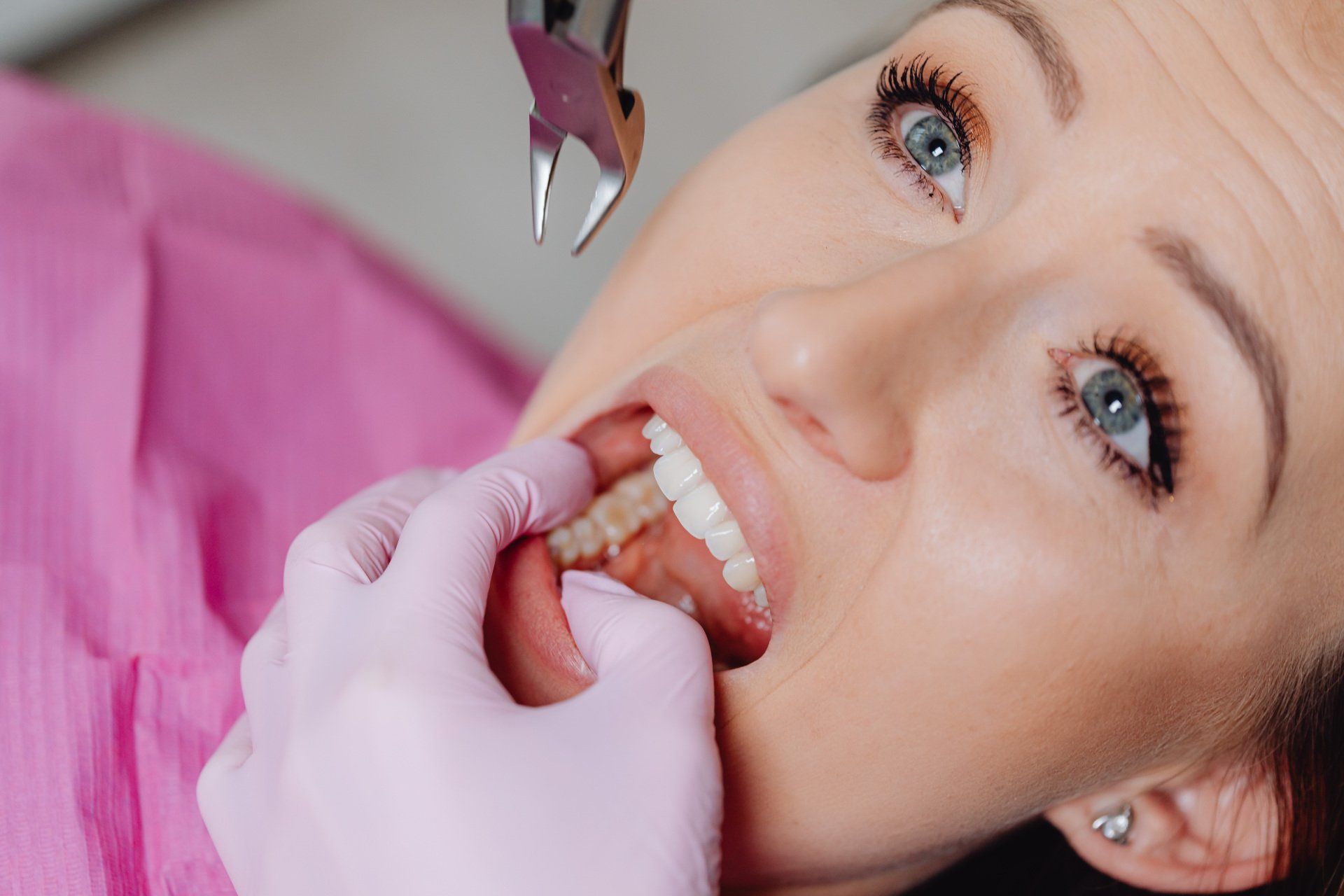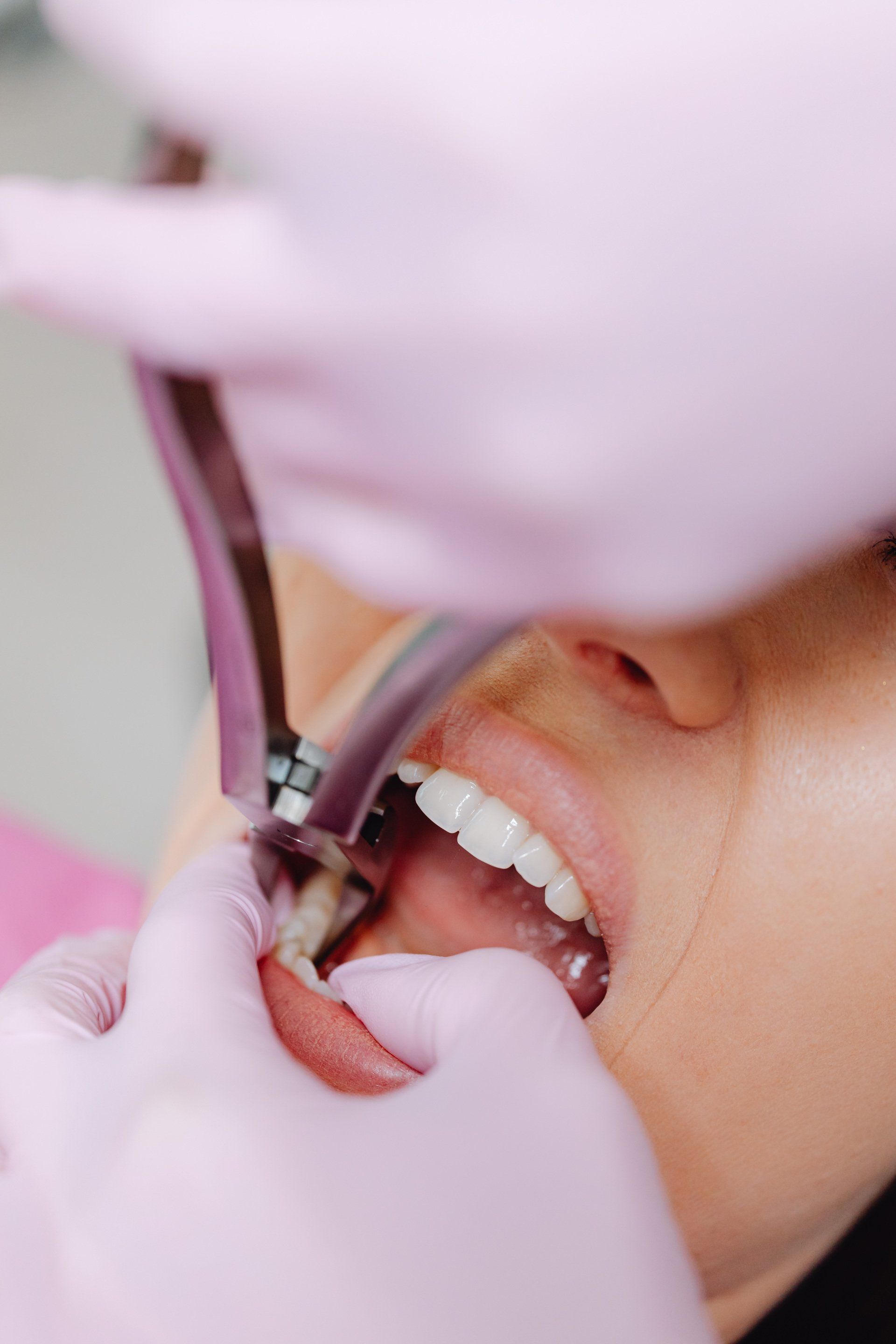Relieve Pain & Keep Smiles Healthy
Maintain the optimal level of your oral health with Tooth Extractions and
Wisdom Tooth
Removals
At
Eastvale Dentistry, our
top priority is to
assist our patients in
preserving their oral
health and achieving a
natural, functional
smile. Whenever
necessary, we provide
expert tooth extraction
services to maintain
optimal oral health. Our
knowledgeable team of
dentists offers a
comprehensive range of
surgical procedures,
including tooth removal
and replacement options,
to ensure that our
patients receive the
best possible care. If
you are experiencing any
oral health concerns,
please don't hesitate to
contact us to schedule a
consultation. We are
committed to preserving
your natural dental
structures and, if
removal is necessary, we
offer high-quality tooth
extraction services and
provide guidance for
restoring your missing
teeth.

Reasons for Tooth Extractions
While addressing dental issues, repairing damaged or decayed teeth is often the preferred approach. However, it is worth noting that there are circumstances where the extraction of these teeth is the optimal course of action to maintain your overall oral and general health.
Keep an eye on your wisdom teeth
Ensuring proper monitoring of the development of your wisdom teeth holds paramount importance in maintaining your oral health. At Eastvale Dentistry, we utilize x-ray imaging to assess the progress of your wisdom teeth growth. Our expert dentists analyze your x-rays to determine the developmental stage of your third molars and their root placement within your jaw.
Additionally,
our dentists evaluate the
positioning of your wisdom teeth in
relation to surrounding teeth,
preventing potential complications
such as impaction. While misaligned
wisdom teeth can damage neighboring
teeth or become impacted, our
skilled team can extract any
problematic teeth to alleviate
discomfort and prevent further
damage. It is crucial to note that
not all mouths have ample space for
four wisdom teeth. If your mouth
cannot accommodate these teeth, our
team will provide guidance and
treatment to mitigate any negative
effects. Trust in our expertise to
ensure optimal oral health and
wellness.

Caring for your smile after tooth extraction
Upon
completion of the tooth extraction
procedure, our dentists will provide
you with a set of individualized
guidelines to facilitate a rapid and
painless recovery. In the event that
a tooth replacement is deemed
necessary, we shall start the
treatment process without delay. In
the initial hours post-tooth
extraction, it is essential to steer
clear of any activity that may
irritate the extraction site.
Applying clean gauze to the socket
and replacing it as needed is
recommended. To alleviate swelling
and discomfort, utilizing ice packs
at ten-minute intervals is advised.
For the first day after treatment,
we suggest sticking to liquid intake
and gradually introducing soft and
chewy foods as per your comfort
level. Should you experience any
discomfort, fever, heightened
sensitivity, or an increase in pain,
kindly notify our proficient team at
Eastvale Dentistry, and we will be
thrilled to address your concerns
promptly.
Are your wisdom teeth causing pain or you want to avoid future problems?
Book an appointment or give us a call to learn more about the next steps for tooth extractions and wisdom tooth removals!
Commonly asked questions about Wisdom Tooth Extractions
-
What are Wisdom Teeth?
Third molars, commonly known as wisdom teeth, are the ulatest teeth to emerge in the oral cavity. These teeth are tasked role of grinding food during the digestive process. They can be found at the posterior end of the mouth, adjacent to the second molars and close to the throat's entrance. Typically, the development and eruption of wisdom teeth occurs between the ages of 15 and 20, As the name suggests, wisdom teeth eruption happens at critical phase associated with maturity and attaining wisdom.
-
Why Should I Have Them Removed?
As a general rule, wisdom teeth tend to be the last teeth that comes out and develop within the human mouth. As a consequence of this, they frequently encounter a shortage of space within the oral cavity, making it difficult for them to properly erupt and function as teeth. This lack of space can lead to a number of negative consequences for overall dental health. In cases where the teeth are unable to properly align and emerge from the gums, they are classified as "impacted" and unable to contribute effectively to the chewing process.Also they may cause damage to the adjacent teeth because of side way eruption path.
-
So, Do I Really Have To Have Them Removed?
Always it is better to prevent complications and hassle in future.It is within our capabilities to proactively detect patients who may present complications, and initiate prompt interventions during a period of optimal surgical impact and heightened recovery potential.
-
What is The Best Age To Have Them Removed?
In the event that the insufficiency of space in the oral cavity for the emergence of third molars is detected, early extraction is strongly recommended. The optimal timing for the removal procedure varies among individuals, ranging from as young as 11 or 12 years of age to as late as 17 or 18. Timely intervention is associated with expedited convalescence, better outcomes and reduced incidence of postoperative complications, particularly when compared to older patients.
-
What If I Don’t Have Them Removed Now?
In the past, a common recommendation for wisdom teeth was a "wait and see" approach. Unfortunately, numerous individuals who lacked sufficient space experienced localized issues as previously discussed. However, this approach poses a significant challenge for patients who require the removal of impacted wisdom teeth in their thirties, forties, fifties, or beyond. In such cases, the post-operative recovery period is often extended, and the complication rate is higher. Furthermore, managing these complications in older patients is considerably more challenging than in younger individuals. Therefore, a more proactive approach to address wisdom teeth concerns is advisable to prevent future complications and ensure optimal treatment results.
-
If I Decide to Do It, When Should I Have Them Removed?
Given sufficient preparation, most of the people can effectively have them removed in any given timeframe, provided they have prepared in advance.
-
What Happens On The Day They’re Removed?
After your procedure, you will receive a prescription to mitigate any discomfort and inflammation that may arise after surgery. It is essential to take these medications promptly to prevent the onset of pain. Additionally, you will be provided with detailed post-operative guidelines to adhere to. You can rest assured that upon leaving the office, you will feel at ease. Patients typically prefer to return home and refrain from heavy physical activities for several days.
-
What Happens Afterwards | What Will I Feel Like?
It is highly advisable to have enough rest for a brief period subsequent to your medical intervention. It is imperative that you adhere strictly to the post-operative guidelines provided, as they are intended to promote utmost comfort in the initial days following your procedure. We recommend that you offer your body ample time to commence the healing process prior to resuming any strenuous social or athletic engagements.
-
What Does It Cost | Will My Insurance Cover It?
As there are various categories of impacted wisdom teeth and diverse anesthesia choices, we are unable to provide you with an accurate estimate of our service charges until we have examined your x-rays. It is worth noting that every insurance provider has distinct guidelines concerning the scope of coverage for a particular surgical procedure. We urge you to contact your dental insurance carrier to ascertain your coverage and financial responsibility.
-
What If I Have Questions Before Surgery?
We would be pleased to arrange a consultation with you, during which we can review the results of your x-ray and address any inquiries you may have.
Your Smile is Our Success
Office Info
Tel: (905) 472-2345
Fax: (905) 472-2399
Email:
info@eastvaledentistry.ca
Address: 7 Eastvale Dr., Unit 6
Markham, ON, L3S 4N8
Business Hours
- Monday
- -
- Tuesday
- -
- Wednesday
- -
- Thursday
- -
- Friday
- -
- Saturday
- -
- Sunday
- Closed
Copyright © 2023 Eastvale Dentistry. All Rights Reserved. Privacy Policy.
